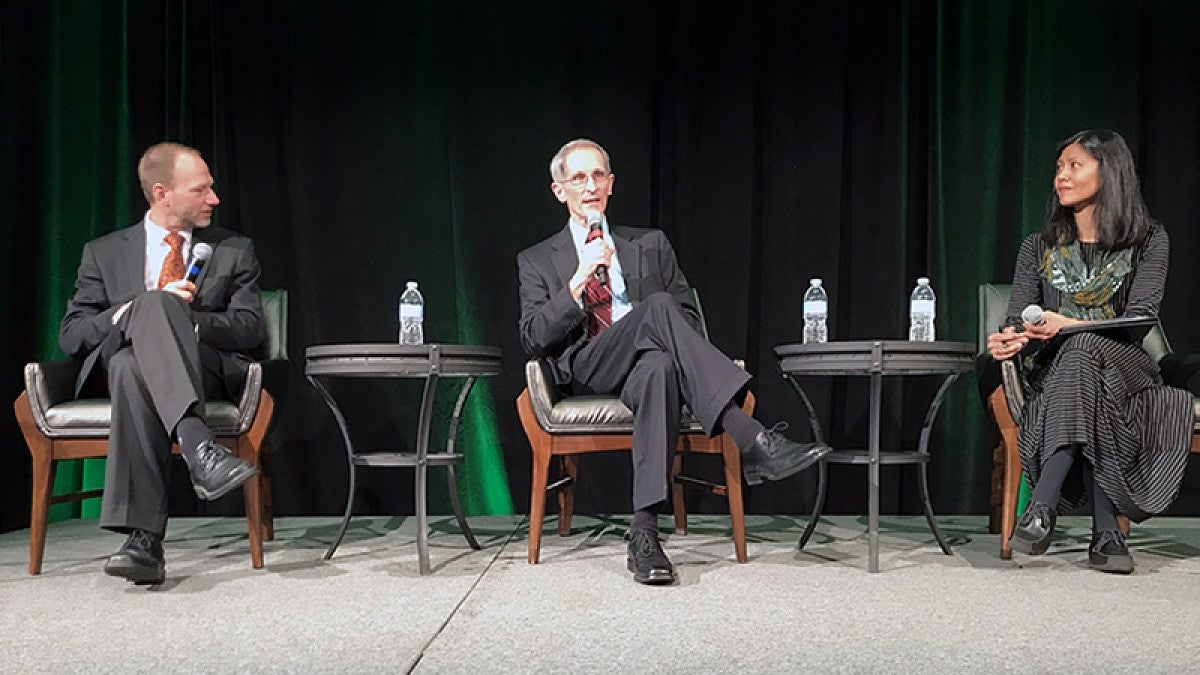Though it doesn’t always feel like it, the U.S. economy has hit the “sweet spot” and is on track to be one of the longest recovery periods on record, said economists Tim Duy and Bruce McCain on Thursday at the 14th annual Oregon Economic Forum in Portland.
“After eight long years, we’ve finally reached a full-employment economy,” said Duy, director of the Oregon Economic Forum and UO professor of practice in economics. “It will feel tighter. There will be more traffic and longer lines at Starbucks. Companies will have a harder time recruiting new employees and job growth will be slow. It will feel like a loss of momentum, because companies can’t grow as fast, but that’s more related to supply-side constraints rather than moving into a recession.”
Both Duy and McCain expected the economy to continue at the current pace for another two to three years and did not see the signs of a “bubble.”
“The markets are fully valued, but bubble territory looks very different,” said McCain, chief strategist for Key Private Bank. “The next recline after a recession tends to be milder. When you were scared out of your wits like companies were in the last recession, there tends to be more restraint in recovery, which leads to a milder next recession.”
The longer the economy stays at this pace, the better it will be for firms and Oregonians, Duy said. Opportunities exist to both pull into employment people who were marginalized during the recession and for greater economic development.
UO President Michael H. Schill provided welcoming remarks to the audience of 300.
“The University of Oregon, through our College of Arts and Sciences and Department of Economics, hosts this program because we care deeply about our state and its prosperity,” Schill said. “Part of our mission as a public research university, in addition to creating and sharing knowledge, is to serve our community and state. The UO’s past and future are intertwined with the economic prosperity of Oregon and vice versa.”
Alcohol, tobacco, lottery and marijuana were the focus during the “Oregon’s Growing Sin Economy” panel. Josh Lehner, economist in the state’s Office of Economic Analysis said these vice taxes contribute $2–3 billion per biennium, representing 3 percent of the state’s revenue. That number, however, doesn’t fully capture taxes on legalized marijuana.
“Within three days of legalized sales in Oregon, sales along the Washington border dropped 40 percent,” said Ben Hansen, UO associate professor of economics, noting there was a period of time when it was legal to possess marijuana in Oregon before it was legal to buy it. “What we saw is that people wanted to buy from legalized, regulated markets.”
Lehner and Hansen discussed how sales of cannabis might be affected in the future based on social acceptance, federal involvement and potential public health issues.
“If marijuana was legalized at the federal level, it would have positive impacts, like allowing these businesses to have a bank account or use a credit card,” Hansen said. “But there would also be entrances from others, like big tobacco, who might try to make it more physically addictive.”
The keynote speaker, Lawrence Mishel, president of the Economic Policy Institute, discussed the effect of robots and automation on the labor force.
“Robots get a lot of attention. In periods of high unemployment, people gravitate to an explanation that automation is to blame,” he said. “Robots are really a distraction for the main crisis at stake, which is the crisis of job quality and wage stagnation.
Mishel points to the last 150 years as evidence robots are not taking jobs.
“If automation were responsible for unemployment, then we would see a higher rate of unemployment every decade since 1830,” he said. “The dynamic is that automation leads to the displacing of some jobs, but to the creation of others.
—By Heidi Hiaasen, University Communications


